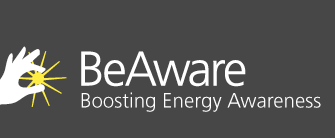BeAware

Reduction of energy consumption and related harmful emissions is a societal challenge of first order that must be addressed with a combination of technical, economical, and social means. So far, energy conservation has largely focused on new technologies and automation, leaving users in the passive role of consumers. However, anecdotal but gathering evidence suggests strongly that users are willing and capable to adapt actively their behaviour to energy-saving direction if given the necessary feedback, support, and incentives. This holds the potential of reducing significantly and cost-effectively energy use without impacting adversely users’ experienced level of comfort.
Hybrid cars running on a combination of electricity and gasoline give an illustrative example of this phenomenon from another domain. Some of these cars include extensive real time displays of energy use, enabling drivers to adapt their driving styles to maximise battery usage. For instance, drivers learn to run the battery almost dry on an uphill stretch on their daily commute, and recharge it again from braking on the following downhill.
Several studies have shown that renewable energies are expected to gain a significant market share only within the next 10 – 15 years. Energy savings from consumers can be realized faster and could account for up to 20% of energy savings. Unfortunately, at present energy consumers are scarcely motivated to save energy, unless they gain immediate economic benefits.
While consumers’ environmental awareness is becoming higher and a willingness to make lifestyle changes does exist, this willingness has not been effectively translated into concrete energy saving actions. A decisive factor for this is the lack of awareness; due to non-existing instant feedback on energy usage as energy consumption is generally post-paid and based on average estimated consumptions. Energy consumption processes are currently not transparent to consumers, making it necessary to create new feedback approaches on energy usage that would enable learning of energy conservation strategies. This is due mainly to the high costs of the technologies, often proprietary, which would allow the energy companies to measure the energy consumptions of their customers.
The present and foreseeable development and convergence of the ICTs and the energy networks is, however, paving the way to new possibilities for measuring and controlling the customer energy consumption at affordable costs. In particular, technologies such as ubiquitous and pervasive computing, ambient intelligence, intuitive user interfaces, mesh networks, digital home and distributed service infrastructures are contributing to enable new services and business models for the energy suppliers, which in the coming years could offer a set of value-added services to their customers, including real time processing and feedback of information, allowing consumers to learn and share conservation strategies.
The BeAware project is aimed at consumer power conservation in households, which currently holds a potential for reducing waste without impacting adversely on comfort.
The prime challenge is to provide in a situated way detailed and next-to-real time awareness cues on energy consumption, hence turning consumers into active players, and to integrate these through mobile and ambient interfaces into consumers’ everyday lives while taking the relevant cognitive capabilities and social practices into account.
The vision of BeAware is of an active and aware consumer, who becomes motivated to consume efficiently energy when learning about own and other’s consumption and energy profile usage. The vision is feasible thanks to a set of enabling ICT technologies, which are expected to become increasingly affordable in the coming years.
News about BeAware
Clicca qui per le ultime news su BeAware
Official Project Website
http://www.energyawareness.eu
BeAware in pillole (pdf – in inglese)
Click here



